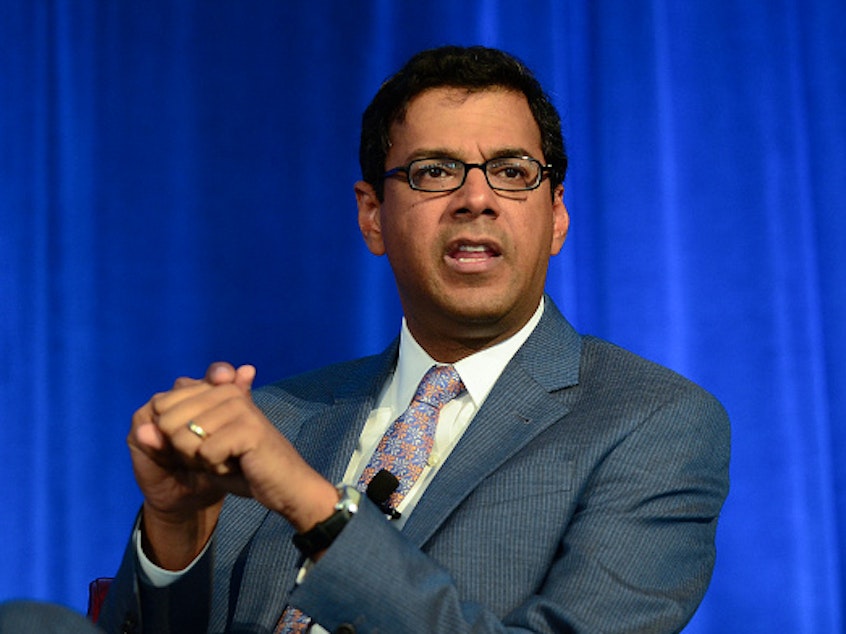Faced with COVID and monkeypox, new USAID leader draws strength from African proverb

Dr. Atul Gawande began a challenging new job this year. The surgeon, former New Yorker staff writer and bestselling author of books like Being Mortal: Medicine and What Matters in the End, is now the head of global health for the U.S. Agency for International Development, which provides foreign and humanitarian aid around the world.
So far it's been quite a daunting year.
The pandemic has of course continued and cases are now surging in many countries. Then there's the worldwide monkeypox outbreak, the potential global repercussions of the U.S. Supreme Court's decision to overturn Roe v. Wade, and other health crises that have arisen in the wake of the pandemic.
Gawande spoke to NPR about the agency's top health priorities in low-income countries. Here are highlights from the interview.
An African proverb is his guide:
I've learned to internalize an African proverb: "If you want to go fast, go alone; but if you want to go far, go together."
Getting everybody together across all of our agencies in the government and with Congress and our different political parties, plus getting agreements with other countries around the world — it's just slow. It's a lot of time on the phone, a lot of time pulling people together. That's the work.
The U.S. is working to up vaccination rates in lower income countries:
Lower-income countries have fragile health systems. They don't have a lot of staff. They don't necessarily have the cold chain and the refrigerators in place [to keep COVID vaccines cool]. We have helped a set of countries get some of the refrigerators into place in rural areas and we have been able to shore up surge staffing for vaccination campaign events. We have been doing that from the moment that the Biden administration came into place.
But U.S. resources are a problem when it comes to these efforts so that's a new challenge:
Just as those countries are getting the resources and supplies, we are in a place where Congress is no longer supporting resources for us to continue to enable that surge in vaccination.
One is bringing home the message — on Capitol Hill and to people like you — that COVID is a disease that hasn't gone away and won't for some years to come. Second, variants come out of these places that don't have adequate vaccination and control of these diseases. Third, our economic damage comes from supply chains that reach everywhere around the world.
The number of deaths in the world depends on us being supportive of getting the whole world to stop the pandemic.
Monkeypox is a similar challenge to COVID:
You can stop the human-to-human transmission by testing for the illness, notifying contacts and isolating until the pox rash goes away. But the capacity to drive out these basic precautions haven't been supported in the lower-income parts of the world.
The existing monkeypox vaccine could help:
The U.S. is now giving money to manufacturers to drive up supply. We are ordering enough vaccine to get it to people at risk or people who are exposed [to monkeypox in the U.S.]. And that's it. Access to those kinds of capabilities is always the last to get to the lowest-income parts of the world.
The pandemic has drawn attention away from other health issues:
In the two years of pandemic, COVID-19 has created an increase in deaths that has resulted in the first global reduction in life expectancy in a century.
Only a minority of those deaths have come directly from COVID. Instead, [deaths have come from COVID's] effects on the health system with health-care workers out and health-care needs being diverted to COVID — but then also the economic impacts that COVID has driven. Supply chain [issues have created] food shortages and caused malnutrition to skyrocket.
Add to that climate events like heat waves, cyclones and hurricanes, and then war that has further cut food supplies. And you have a situation where total death rates in the world have gone up more than 20%.
We need to ramp up the global health care workforce:
[We need] to recognize that all of our work — whether it's COVID vaccinations, being able to detect if there's a monkeypox outbreak, making sure that the acutely malnourished are getting emergency food, that malaria is being treated — goes through primary health care.
The primary health care workforce is the single most important place that we are seeking to make investments. The president has made a request for $1 billion for a health worker initiative in the next budget to support low-income countries. When the health system is fragile, when it's subject to all these kinds of health shocks, this is the critical workforce that can pivot to the most important needs. This is the group that can address future outbreaks, current COVID needs and is the infrastructure for addressing our overall drop in life expectancy.
The U.S. Supreme Court ruling on the overturn of Roe v. Wade will not change USAID's work:
The Biden administration's commitment on sexual and reproductive health and rights is not changing one iota around the world. It is absolutely critical that we continue to move our work forward in those domains.
USAID will continue to protect human rights:
However, the ruling has raised concerns for people around the world — about whether rights for gay, lesbian and transsexual people will be curtailed; whether people's rights and access to contraceptives and family planning will be affected.
There is enormous fear that this is only the first step in a process that's taking away people's privacy rights and sexual and reproductive health rights. And so we are working to make it clear around the world that we will champion the needs of everybody to have adequate reproductive health needs met — and that their rights as human beings are continuing to be protected as well. [Copyright 2022 NPR]



